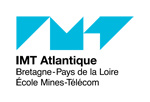Feasibility analysis of a thermo-hydraulic process for reverse osmosis desalination : experimental approach
Résumé
Reverse osmosis is a widely used desalination technique, mainly because of its low specific energy consumption. Autonomous reverse osmosis processes are increasingly developed because of their energy efficiency and the decentralization of numerous water stress areas. In this context, a reverse osmosis process powered by an innovative thermo-hydraulic desalination system using heat has been developed. This new process aims to autonomously produce fresh water from a brackish water source, compatible with the needs of a small remote village. This new reverse osmosis desalination process exploits a low temperature heat source (60-80°C) such as the one delivered by solar flat-plate collectors. The heat is then converted into hydraulic energy by a thermodynamic engine cycle in which the expansion of the working fluid directly pressurizes the brackish water by means of hydro-pneumatic tanks, while energy from high pressure brine is recovered by an innovative hydraulic cylinder. Since previous numerical work on this process shown a specific energy consumption about 12 kWh.m-3 for a 4 g.l-1 brackish water, which is close to performances of relatable processes, an experimental full scale prototype has been built. The work presented here shows the results of the experiments conducted on this prototype, its behavior and performances. Numerical and experimental results are compared and discussed, and confirm the feasibility of the process. These tests show a promising cyclic functioning as the numerical results suggested. The freshwater production and salinity is remaining under the drinkability limit and the experimental specific energy consumption has been calculated to 25 kWh.m-3. In order to reach better performances, transfer tanks needs to be improved to avoid heat transfer between working fluid and saltwater which leads to condensation issues, and another hydraulic cylinder design needs to be consider to avoid gasket abrasion.
